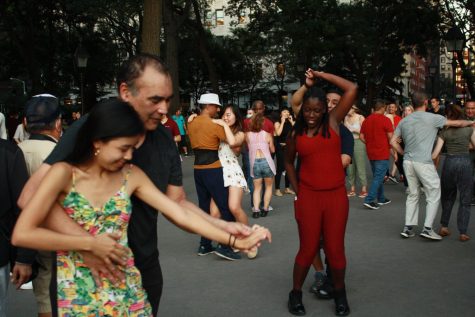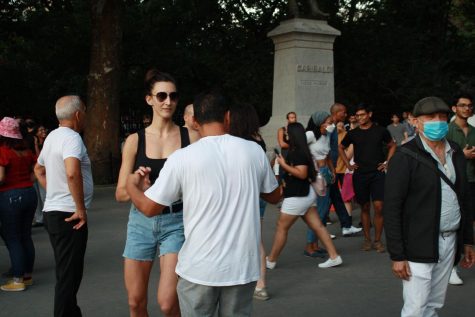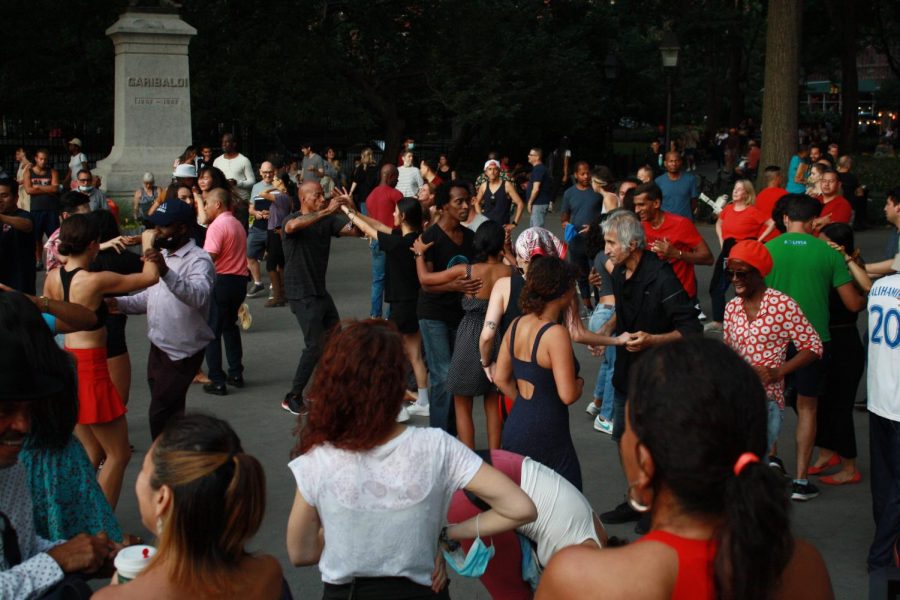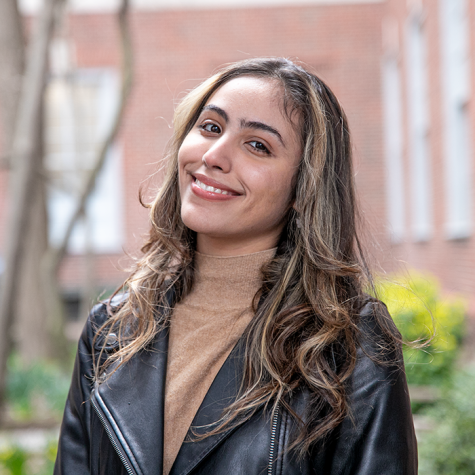Salsa dance classes bring spice to Washington Square Park
Free weekly dance classes have brought salsa to Washington Square Park every Tuesday. The classes continue until the end of September.
Salsa learners gather at Washington Square Park for their lesson. Free salsa lessons are scheduled between 5:30pm to 8:00pm every Tuesday till the end of September. (Photo by Maria Freyre)
September 22, 2021
Parkgoers become salsa dancers when they step into Washington Square Park’s Garibaldi Plaza for salsa Tuesdays.
These weekly salsa classes are for everyone from beginners to professionals. Since Aksana Almaguer brought this event to life back in June, it has drawn in a diverse group of New Yorkers from different cultural backgrounds and ages.
High school English teacher Kay, who only gave her first name, learned about the classes from her roommate. A week later, she went with two of her coworkers to unwind after a stressful day at work.
“It’s a faster change of pace, but it’s a nice one,” Kay said.
Constantly exposed to salsa in her Peruvian-Cuban household, Almaguer started dancing in 2004. It has since grown to be one of her greatest passions. During lockdown, Almaguer grew tired of dancing alone in her room, so once COVID-19 restrictions eased in the city, Almaguer decided to take her speakers to Washington Square Park and, with the help of social media, encourage people to join her.
“My goal was to put the music on, have a party and invite the world. And I just want to dance, dance, dance,” she said.
When it came to finding the right location for Salsa Tuesdays, Almaguer, who also runs a YouTube channel, looked no further than Washington Square Park after interviewing parkgoers for her YouTube channel.
“I do improv and I just interview random people and the best people are in Washington Square Park,” Almaguer said. “They are so amazing, so I was like, I gotta do it here … I knew the community would be open to it.”
Many of the dancers, who were once just observers, have come to join the salsa group.
“I think because we’re in the park, and we’re so loud, it’s great to have people watching,” Almaguer said. “It draws people that would normally not make it a point to go to the scene and dance.”

A willingness to learn is the only requirement to participate in Salsa Tuesdays. Almaguer teaches a beginner’s class right before the social to encourage everyone to participate, even those with no initial intention to attend the event.
“One thing I do is that you see the people on the outskirts,” she said. “I really make a point to go and welcome them and I’ll teach them a couple of basics right there and then so they can kind of enjoy the music while standing around.”
Salsa Tuesdays’ welcoming nature has created a community of dancers that comes from beyond just the park’s boundaries. Almaguer sees the event as a collaborative environment where parkgoers-turned-participants dance, teach and become friends with each other.
“I kind of started this as a family gathering, and the whole world is welcomed,” Almaguer said.
The scene is a small example of New York City’s multiculturalism, with people of different ages, ethnicities and lifestyles coexisting harmoniously through salsa. It has become more than a dance social — but rather, a space where participants can take time to relax, try new things and establish new friendships.
“You don’t know who you’re gonna get, who’s gonna be interested that day and what new friends you’re gonna make,” Almaguer said.
Trevor Núñez came from Canarsie, Brooklyn, with his friend, first-year NYU Law student Hector Correa, to check out the social after a mutual friend sent them a flyer of the event. Núñez, who was excited to be back in New York City after spending the summer in Philadelphia, was overjoyed at witnessing the event.
“I think it’s incredible,” Núñez said. “This is almost quintessentially New York City. You get a bunch of people, half the people aren’t even Latino, but everyone’s just dancing and enjoying the music, the culture, the vibes.”
Like Almaguer, Correa and Núñez hail from families where salsa is a cultural staple — the former is Colombian and the latter is Guatemalan.
“If I don’t dance it, I’m gonna get kicked out of my family, essentially,” said Correa, who’s taken up salsa dancing as a hobby for over three years.

Salsa Tuesdays is an example of how salsa continues to permeate mainstream culture, similarly to how reggaeton has skyrocketed in popularity in the United States in recent years. Through weekly playlists Almaguer creates on her YouTube channel, which features the likes of salsa giants — such as El Gran Combo de Puerto Rico, Tito Puente and Héctor Lavoe — many New Yorkers are exposed to a style of dancing that has solidified the city’s Latinx communities since the mid-20th century.
“I’ve always thought that Latin America has become a big cultural exporter,” Correa said. “So to see so many people from different backgrounds dancing salsa means that we’ve done some of a good job at exporting part of our culture.”
What began with Almaguer will end with support from the vast community she has fostered. The last Salsa Tuesday will be held on Sept. 28 from 5:30 p.m. to 8:00 p.m., but many dedicated attendees have requested that the event be extended into the colder months.
Contact Maria Freyre at [email protected].

























































































































































